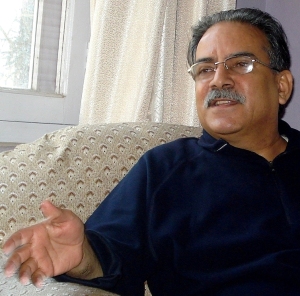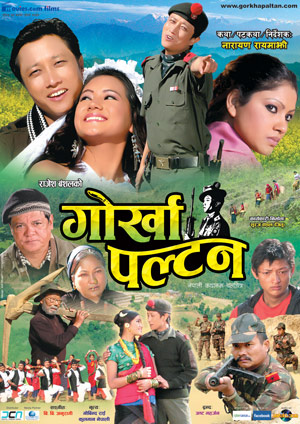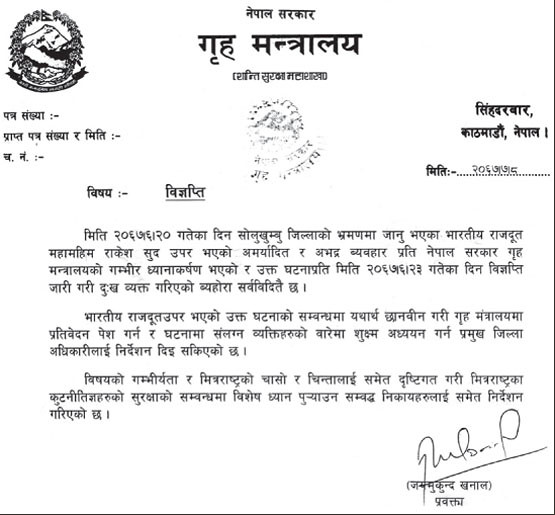नेपाल, भारत र चीनबीच रणनीतिक समझदारी कायम गर्नुपर्ने प्रस्ताव राखेर माओवादी अध्यक्ष पुष्पकमल दाहाल चीनको चारदिने भ्रमण गरी स्वदेश फर्केका छन् । उक्त प्रस्ताव लिउर उनी छिट्टै भारतसमेत जाने तयारीमा छन् । चीनले माओवादी प्रस्तावलाई सकरात्मक रुपमा लिएको उल्लेख गर्दै भारतले पनि त्यसलाई सकरात्मक रुपमा लिने उनको विश्वास छ । त्यस्तै छिट्टै सरकार बन्ने अवस्था नभए संविधान संशोधन गरी आर्थिक संकटबाट मुलुकलाई जोगाउनु पर्ने बताउँदै दाहालले राजनीतिक सहमति हुने विश्वास समेत व्यक्त गरे । हालैको चीन भ्रमण, राजनीतिक गतिरोध, शान्ति प्रक्रिया र माओवादी अन्तर संघर्षका विषयमा कान्तिपुरका सुधीर सर्मा र गंगा बीसीले उनीसँग गरेका संवाद-
फर्केका छन् । उक्त प्रस्ताव लिउर उनी छिट्टै भारतसमेत जाने तयारीमा छन् । चीनले माओवादी प्रस्तावलाई सकरात्मक रुपमा लिएको उल्लेख गर्दै भारतले पनि त्यसलाई सकरात्मक रुपमा लिने उनको विश्वास छ । त्यस्तै छिट्टै सरकार बन्ने अवस्था नभए संविधान संशोधन गरी आर्थिक संकटबाट मुलुकलाई जोगाउनु पर्ने बताउँदै दाहालले राजनीतिक सहमति हुने विश्वास समेत व्यक्त गरे । हालैको चीन भ्रमण, राजनीतिक गतिरोध, शान्ति प्रक्रिया र माओवादी अन्तर संघर्षका विषयमा कान्तिपुरका सुधीर सर्मा र गंगा बीसीले उनीसँग गरेका संवाद-
चीन भ्रमण
पछिल्लो समयमा माओवादी नेताहरूको चीन भ्रमण बाक्लिएको छ, कारण के हो ?
सामान्यतया सञ्चारमाध्यममा चर्चा भएजस्तो किसिमको भ्रमण हामीले गरेका होइनौं । वैचारिक कारणले चीनमा जेजस्ता प्रयोग भएका छन्, त्यसको अध्ययन गर्ने हाम्रो पार्टीको प्राथमिकताको विषय हो । त्यसकारणले चीनतर्फ हाम्रो ध्यान जाने भयो । दोस्रो, म जतिपटक गएँ, खासखास कारणले गर्दा जानुपरेको छ । पहिलोचोटि बेइजिङ ओलम्पिकको समापन समारोहमा गएँ, त्यसबेला विश्वका नेताहरू पनि गएका थिए । दोस्रोचोटि चीनको आर्थिक विकास स्थितिको अध्ययन गर्ने उद्देश्यले पार्टीको नेतृत्व गर्दै गएँ । यसपटक सांघाई एक्स्पोमा पुगेँ । यो चीनको मात्र एक्स्पो होइन, अन्तर्राष्ट्रिय रूपमा आयोजना गरिएको हो । यसमा मलाई विश्व नेताहरूमध्येबाट छानिएको हुनाले समेत जान जरुरी थियो । त्यसकारण मेरो प्रत्येक चीन भ्रमणका विशिष्ट कारणहरू छन् तर कतिपयले त्यसलाई अनावश्यक रूपमा चीनसँग नजिकिएको, कुनै देशविषेशको विरोध गरेको भनेर राजनीतिसँग जोड्न खोजेका छन् जसमा सत्यता छैन ।
चिनियाँहरूसँग राजनीतिक कुराकानी नै भएन त ?
यो कुरा पक्कै हो कि अन्य देश जाँदा जस्तै चीन जाँदा पनि स्वाभाविक रूपमा राजनीतिक व्यक्तिहरूसँग कुराकानी भयो । मसँग प्रत्येक पटक कुराकानी हुँदा चिनियाँ नेताहरूले नेपालमा शान्ति होस्, संविधान बनेर स्थिरता र विकास निर्माण होस् भन्ने चाहना राखेका छन् । नेपालमा शान्ति र स्थिरता भयो भने तिब्बतको सुरक्षा हुन्छ भन्ने उनीहरूको बुझाइ छ । तिब्बतसँग रणनीतिक रूपमा जोडिएको कारणले चिनियाँ नेताहरूले नेपालमा शान्ति, स्थिरता र विकास निर्माण होस् भन्ने चाहेका हुन् । त्यसो भए सम्भावित अप्ठ्यारा रोक्न सकिन्छ भन्ने देखिन्छ । उनीहरूले सधैं अहस्तक्षेपको नीतिप्रति दृढ छौं भन्ने गरेका छन् । कतिपय मानिसले हामी चीनसँग ढल्कन खोजेको, भारतको विरोध गर्न खोजेको भन्ने गरेका छन् जुन सत्य होइन । यसपटक चीनका नेताहरूले माओवादी ठूलो पार्टी हुनुको नाताले भारतसँग राम्रो सम्बन्ध होस् भन्ने सुझाव दिएका छन् ।
चीनले भारतसँग कस्तो सम्बन्ध राख्न सुझाव दिएको हो, यसको व्याख्या गरिदिनुस् न ?
चिनियाँ नेताहरूले भारतसँग राम्रो सम्बन्ध बनाउने कुरा एउटा सुझावका रूपमा राखेका हुन् । उनीहरूसँग कुरा हुँदा तपाईंहरू यसो गर्नुस् भनेर निर्देशन वा दबाब दिएजस्तो हामीले कहिल्यै महसुस गरेका छैनौं । हामी भारतसँग सम्बन्ध सुचारु राख्न आफैं प्रयत्नशील छौं भन्ने पनि उनीहरूलाई थाहा छ । अर्को, अहिले चीन र भारतबीच व्यापार क्रमशः बढ्दै गएको र यो वाषिर्क ६० बिलियन डलर बराबर पुगेको स्थिति छ । यस्तो अवस्थामा हामी यो क्षेत्रमा शान्ति र स्थिरताको निम्ति सबै शक्तिले सकारात्मक सोच राखून् भन्ने ठान्छौं ।
भारत सरकार र त्यहाँका नेता, बुद्धिजीवी, मिडियासँग हाम्रो धारणा स्पष्ट गर्ने कोसिस भइरहेको पनि छ । मैले नेपाली कांग्रेसको महाधिवेशनको सेरोफेरोमा कांग्रेस (आइ) देखि भारतीय जनता पार्टीलगायतका भारतीय नेताहरूसँग कुराकानी गरेको छु । अब एकचोटि दिल्ली जाने र फेरि भेटघाट गर्ने वातावरण बन्दै छ । हाम्राबीच कतिपय 'कन्फ्युजन' भएका छन् । ती स्पष्ट गर्न जरुरी छ भन्ने हाम्रो पार्टीलाई लागेको छ । हामीले भारतसँग समस्या छन् भन्नुको अर्थ समाधान गर्ने सकारात्मक सोचसहित जान चाहेको हो ।
सम्बन्धलाई नयाँ आयाम दिने उद्देश्यका साथ छलफल गर्न चाहेको हो ।
रणनीतिक समझदारी
तपाईंले चीनबाट र्फकने क्रममा नेपालका मामिलामा चीन र भारतबीच रणनीतिक समझदारी हुनुपर्छ भन्नुभयो । यो अलि अमूर्त कुरा भएन ? कसरी सम्भव हुन सक्छ ?
मेरो विचारमा यो त्यति अमूर्त छैन । यसलाई रहस्यको विषयका रूपमा पनि लिन जरुरी छैन । भारत र चीन तीव्र आर्थिक विकासको गति पकडेका देश हुन् । उनीहरूको जनसंख्या विशाल छ, हामी त्यसको बीचमा छौं । दुवैको विकासबाट नेपाललाई पनि फाइदा पुग्ने वातावरण बनाउनुपर्छ । चीन, भारत र नेपालबीच यहाँको शान्ति, स्थिरता र आर्थिक विकासका बारेमा साझा अवधारणा विकास गर्न सकियो भने त्यसले तीन देशको निम्ति त स्वतः रणनीतिक वातावरण तयार पार्छ । जनतामा पनि विश्वासको वातावरण निर्माण गर्छ । यसले दक्षिण एसियाबाट विश्वलाई नयाँ सन्देश दिन सक्छ । आजभोलि युरोपियन युनियन भनौं या दक्षिणपूर्वी एसिया हेरौं, रणनीतिक साझेदारी बनाउने लहर छ । त्यस दृष्टिकोणबाट हेर्यौं भने अहिले जे समस्या छन्, तिनलाई अलि माथिबाट सम्बोधन गर्न तीन देशबीच रणनीतिक साझेदारी हुन जरुरी छ भनेको हो । यसमा अरू थप रहस्य छैन ।
परम्परागत रूपमा भारतसँग नजिक रहेको अवस्थामा माओवादीले चीनसँग रणनीतिक रूपमा सम्बन्ध राख्न खोजेको हो कि भन्ने आशंका गरिन्छ नि ?
हामी सरकारमा छँदा र मैले प्रधानमन्त्रीबाट राजीनामा दिएपछि पनि पार्टीका तर्फबाट यो कुरा पटकपटक प्रस्ट पार्न खोजिएको छ । हामीले यस क्षेत्रमा जे परम्परा चल्दै आएको थियो त्यसमा नयाँ आयाम थप्नुपर्छ भन्ने महसुस गरेकै हो । परम्परागत सम्बन्धले यो क्षेत्रका जनतालाई प्रतिनिधित्व गरेको छैन । परिवर्तनको प्रवाहलाई प्रतिनिधित्व गरेको छैन । यसले एउटा सानो वर्गको हितलाई मात्र ध्यान दिएको छ । त्यसकारण एक्काइसौं शताब्दीको पहिलो दशकलाई मध्यनजर गर्दै, परिवर्तित परिस्थिति र शक्तिसन्तुलनमा आएको परिवर्तन अनि जनताको चेतनालाई ध्यान दिएर हाम्रा सम्बन्धलाई पुनः परिभाषित गर्नुपर्छ भनेकै हो । यसमा प्रस्ट हुन जरुरी छ ।
जहाँसम्म नीतिगत कुरा छ, हामी चीन, भारत सबै देशसँग राम्रो सम्बन्धको पक्षमा छौं तर समस्याको ठोस प्रकृतिको दृष्टिले हेर्ने हो भने केही समस्या छन् । केही सन्धिसम्झौताका समस्या छन् । राणाहरूले आफ्ना अभिजात वर्गको हितलाई ध्यान दिएर गरेका सन्धि अहिलेसम्म छन् । सिमाना, व्यापारका बारेमा भूपरिवेष्ठित हुनुको नाताले हामीले पाउनुपर्ने पारवहन सुविधाका बारेमा नयाँ परिभाषासहित नेपाल र भारतको सम्बन्ध कमजोर पार्ने उद्देश्यले होइन, बलियो पार्ने उद्देश्यले हाम्रा सम्बन्ध परिभाषित गरिनुपर्छ ।
तपाईंले छिमेकी मुलुकसँग राख्नुभएको रणनीतिक समझदारीको प्रस्तावले थप बाह्य हस्तक्षेप त निम्त्याउँदैन ?
त्यस्तो होइन । बरु कुरा ठीक उल्टो हो भन्ने मलाई लाग्छ । तीनवटै देशको इतिहासलाई हेर्यौं भने सबैका सुरक्षा चासो छन् । यी तीनवटै देशका सुरक्षा चासो एकअर्कासँग जोडिएका छन् । तीन पक्षसँगै बसेर मात्र समस्या समाधान हुन्छ । एउटा बाहिर बसेर सम्बोधन हुँदैन । मैले ल्याएको प्रस्तावले तीनवटै सुरक्षा चासोलाई एकैचोटि सम्बोधन गर्न सक्छ । त्यसपछि शान्तिपूर्ण ढंगले विकास निर्माण गर्न र एकअर्कालाई सहयोग गर्न सकियोस् भनेर ध्यान दिइएको छ । यसले कसरी नेपालमा हस्तक्षेप निम्त्याउँछ ? बरु चीन र भारतले पनि आफ्नो सुरक्षा चिन्ताको कारणले यहाँ जुन गतिविधि गर्नुपर्ने बाध्यता छ, यसले त्यसको अन्त्य गरिदिन्छ ।
भारतसँगको सम्बन्ध
रणनीतिक समझदारीका विषयमा चीनसँग कुरा गर्नुभयो, भारतसँग के गर्नुहुन्छ ?
पाँच, सात महिनायता तीन पक्षका बीचमा समझदारी बनाउनेतिर केन्दि्रत होऔं भनेर मैले भारतीय पक्षसँग पनि यो कुरा राख्दै आएको छु । नेपाल विशाल छिमेकीका बीचमा हुनुको नाताले, हाम्रो पार्टी परिवर्तनको वाहक भएको र जनताले सबभन्दा ठूलो पार्टीका रूपमा जिम्मेवारी दिएको हुनाले हामी नेपालको तर्फबाट समझदारी विकास होस् भन्दै आएका छौं । यसप्रति भारतीय पक्षको सार्वजनिक रूपमा केही प्रतिक्रिया आएको छैन । मलाई के लाग्छ भने यसप्रति कोही पनि नकारात्मक हुनुपर्ने कारण छैन । भारतले हाम्रो प्रस्तावलाई सकारात्मक रूपमा लिन्छ भन्ने मैले बुझेको छु ।
कहिले जानुहुन्छ भारत भ्रमणमा ?
हाम्रो पार्टीको विस्तारित बैठकअघि सम्भव हुँदैन, त्यसपछि जान सकिन्छ । उहाँहरू (भारतीय पक्ष) ले नोभेम्बर १५ वरिपरि भारत जाने प्रस्ताव ल्याउनुभएको थियो । मैले विस्तारित बैठकपछि मिलाऔं भनेको छु ।
नीतिगत निर्णय गर्ने विस्तारित बैठकअघि दिल्ली गएको भए राम्रो हुँदैनथ्यो र ?
होइन, हाम्रो नीति प्रस्ट छ, हामी परिवर्तित परिस्थितिअनुसार नयाँ आयाम दिन चाहन्छौं भन्ने कुरा । अहिले हामी विस्तारित बैठकमा केन्दि्रत भइसक्यौं । त्यसभन्दा अघि जाँदा समयको दबाब
पर्छ । अर्को कुरा त्यसले जे नीति पास गरे पनि कतै दिल्लीको दबाबले त होइन भन्ने भ्रम पर्न सक्छ । त्यसकारण दुइटै कुरा हुन दिँदैनौं ।
तपाईंहरूले राष्ट्रिय स्वाधीनताको आन्दोलन गरेका बेला भारतसँग सम्बन्ध बिगि्रएको थियो, अहिले सुधारोन्मुख हो ?
राष्ट्रिय स्वाधीनताको विषयमा हाम्रो चिन्ता र चासो अहिले पनि यथावत् छ । यसलाई जनताको तहमा सबैको चासोको विषय हो भनेर पुर्याएका छौं । अब यसलाई राजनीतिक तहमा छलफल गरी समाधान गर्ने कोसिस गर्छौं । त्यसो गर्दा भएन भने अर्को ढंगले जनतामा जानुपर्ने हुन्छ । भारतसँगको सम्बन्धलाई नयाँ आयाम दिनुपर्ने आवश्यकतालाई हामीले कति पनि कम गरेका छैनौं । खालि कहिले सडकबाट, कहिले टेबुलबाट समस्या समाधान गर्ने पहल गर्ने कुरा हो । अहिले हामी टेबुलमा बसेर छलफल गर्न चाहिरहेका छौं ।
भारतसँग तपाईंहरूको सम्बन्ध 'ब्युरोक्रेटिक’ तहमा गएको र त्यो राजनीतिक तहमा नपुगेसम्म सुधार हुँदैन भन्ने लाग्दैन ?
ठीक ठाउँमा प्रश्न उठाउनुभयो । जसरी चिज अगाडि बढ्नुपथ्र्यो, राजनीतिक तहमा नभएर, ब्युरोक्रेटिक तहको कुराकानीले समस्या भएको हुन सक्छ भन्ने साँचो हो । मैले अघि नै भनेँ, हाम्रो त्यहाँका केही पार्टी, बुद्धिजीवी, नेताहरूसँग कुरा भएको भन्नुको अर्थ यो विषयलाई सल्ट्याएर राजनीतिक तहमा छलफल गरियो भने समझदारी गर्न सजिलो, समाधान हुन मद्दत पुग्छ भनेको हो ।
बजेट संकट
विषय फेरौं, बजेटको समस्या कसरी समाधान हुन सक्छ ? यसबारे तपाईंहरूको नीति के हो ?
बजेटका कुरामा हामी प्रस्टै छौं । कामचलाउ सरकारले पूर्ण बजेट ल्याउने दुनियाँभर कहीं पनि लोकतान्त्रिक मूल्यभन्दा बाहिरको कुरा हो । त्यो हुनै सक्दैन । कामचलाउ सरकारले बजेट ल्याउने कदमले हास्यास्पद, लज्जास्पद स्थितिमा पुर्याउँछ । त्यसैले छिटोभन्दा छिटो नयाँ सरकार गठन गर्न राजनीतिक दलहरूले गम्भीरतापूर्वक लिनुपर्छ । समझदारी हुने हो भने दुई दिनमै सरकार
गठन हुन नसक्ने देखिँदैन । सरकार गठन गरौं, पूर्ण बजेट ल्याऔं । कात्तिकभित्र बजेट ल्याउँदा कुनै समस्या पर्दैन ।
यदि सरकार गठन हुन सक्दैन भने यो सरकारले बजेट ल्याउन सक्दै सक्दैन । यदि त्यसो हुन सक्दैन भने संविधान संशोधन गरी साधारण खर्च गर्न सक्ने प्रावधान ल्याउन सकिन्छ । त्यसो गरियो भने आर्थिक संकट आउँछ भन्ने चिन्तालाई सम्बोधन गर्न सकिन्छ । त्यसो गरे राजनीतिक दलले पहल गरेर समस्या समाधान गरेको भन्ने देखिन्छ । अर्को कुरा संविधान संशोधनका लागि दलहरू सहमतिमा पुग्छन् । त्यसले नयाँ सरकार बनाउन पे्ररित गर्छ । त्यसकारण यो सरकारले बजेट ल्याउने सोच्नु बिल्कुल गलत हुन्छ । मुलुक ठप्प गरेर राजनीतिक गत्यावरोध गर्ने पक्षमा हामी छैनौं । सरकार बनाउने वातावरण बनाऔं, त्यो भएन भने राजनीतिक दल बसेर संविधान संशोधन गरौं, समाधान त्यसबाटै निस्कन्छ । त्यसो भए लोकतान्त्रिक पद्धति हावी हुन्छ ।
तर सरकार त छिटो गठन हुने देखिन्न नि ?
विडम्बना यही छ । पन्ध्रौंचोटि निर्वाचन हुँदै छ, तैपनि सरकार गठन हुने सम्भावना छैन । हिजो बिहान माओवादी, कांग्रेस र एमालेबीच कुरा भएको थियो । केही विषयमा सहमति गरौं भन्ने भाव सबैको छ । मेरो चाँडै कांग्रेसका सभापतिसँग पनि कुराकानी हुन्छ । यो स्थितिको अन्त्य हुन्छ भन्ने लागेको छ ।
नयाँ प्रक्रिया कसरी सुरु हुन सक्छ ?
सहमतिबाटै हुन्छ । बहुमतीयबाट जाँदैन । सहमति हुँदा सबभन्दा सहज र स्वाभाविक कुरा माओवादीको नेतृत्वमा नयाँ सरकारको गठन हुन्छ ।
तर तपाईंहरूले त प्रधानमन्त्रीमा विकल्प मानिसक्नुभएको होइन ?
सहमतिका निम्ति हाम्रो कुराकानी भइरहेको छ । यो प्रक्रियालाई रोकेर अर्को प्रक्रियामा जाने वातावरण बनेपछि सहमति अरूको नेतृत्वमा पनि हुन सक्छ । माओवादीकै नेतृत्वमा सरकार हुनुपर्छ भन्ने हाम्रो दाबी छैन । प्रधानमन्त्री निर्वाचन सुरु हुँदा झलनाथजीलाई समर्थन गर्ने भनेर लेखेर दिएकै हो । एमालेसँग भएको पछिल्लो सहमति पनि त्यही हो । नेपाली कांग्रेससित छलफल हुँदा निष्कर्षमा पुगे जोकोहीको नेतृत्व हुन सक्छ । ठूलो पार्टी हुनुको नाताले, शान्ति प्रक्रियाको प्रमुख हिस्सा हुनुले र राजनीतिक एजेन्डाको प्रस्तोता हुनुको नाताले माओवादीको नेतृत्वमा सरकार हुँदा जति सहज हुन्छ, अरूको हुँदा त्यति सहज हुँदैन ।
शान्ति प्रक्रिया
माओवादी सेनाको समायोजन र पुनस्र्थापन गर्न तपाईहरू तयार नभएकाले समस्या नसुल्झेको होइन ?
नेपाली कांग्रेस र एमालेको एउटा पक्ष 'क्यान्टोनमेन्ट' खाली नगरेसम्म माओवादीलाई नेतृत्व दिन हुँदैन भन्ने तर्क गर्नुहुन्छ । शान्ति प्रक्रिया अघि नबढ्नुको मुख्य कारण त्यही हो । उहाँहरूले लोकतान्त्रिक मूल्यमान्यताविपरीत यो कुरा भनिरहनुभएको छ । नेपाली जनताले सेना बुझाएपछि मात्र हुन्छ भनेर हामीलाई ठूलो पार्टी बनाएको होइन । राजनीतिक दलहरूले चुनावका बेलामा माओवादीले सेना समायोजन र पुनस्र्थापना गरेपछि मात्र सरकार बनाउन पाउँछ भनेर हामी चुनावमा गएको पनि होइन । मेरो नेतृत्वमा सरकार बनाउँदा पनि सर्त थिएन भने अहिले कहाँबाट आयो ?
हामी सेना समायोजन र पुनस्र्थापना गर्न तयार छौं, यसमा हाम्रो नीतिगत विवाद होइन । हामी कार्यान्वयन गर्न तयार छौं । मैले पार्टीको तर्फबाट पटकपटक 'टाइमटेबल' पनि बताएको छु । हामीलाई सरकार बनाउन कांग्रेस र एमालेका नेताहरूले सर्त राखेका छन् । त्यसो हो भने हामी तयार छैनौं । समस्याको गाँठो यहींनेर परेको छ ।
उहाँहरू हामीलाई नागरिक पार्टी भएको छैन भन्नुहुन्छ । नागरिक पार्टी भयो कि भएन भनेर अहिले फैसला सुनाउने कांग्रेस, एमालेका नेताहरू को हुन् ? फैसला १२ बुँदे समझदारी, विस्तृत शान्तिसम्झौता र अन्तरिम संविधानले गरिसकेको छ । जनताले हामीलाई सबभन्दा ठूलो पार्टी बनाएर नागरिक पार्टीमा स्थापित गरिसकेका छन् । हामी त्यो प्रक्रियामा अघि बढ्दाबढ्दै अप्ठ्यारो पार्ने काम किन भएको छ ? यो शान्ति स्थापना गर्ने उद्देश्यले भएको छ कि भाँड्ने उद्देश्यले ? मैले प्रधानमन्त्रीबाट राजीनामा दिने बेला भनेको थिएँ, सबै कुरा शान्ति प्रक्रिया भाँड्नेअन्तर्गत भइरहेको छ । माओवादी पार्टी झन् लोकपि्रय हुँदै जान थाल्यो । अर्को चुनाव भयो भने दुई तिहाइ बहुमत माओवादीको आउँछ भनेर विश्वले भनेको छ । त्यसैले माओवादीलाई जसरी पनि रोक्नुपर्छ भन्ने सोचले काम गरेर यो तर्क ल्याइएको हो । हामी शान्ति प्रक्रिया टुंग्याउने पक्षमा छौं भने हाम्रा अगाडि सर्त तेस्र्याउने अधिकार कहाँबाट आयो ? माओवादीको नेतृत्वमा सरकार भए पो शान्ति प्रक्रिया टुंग्याउन सजिलो हुन्छ ।
समायोजन र पुनस्र्थापनाका लागि लडाकु संख्याको पहिल्यै टुंगो लगाउने कुरा पनि आएको छ, त्यो सम्भव छैन ?
संख्या तोकेपछि मात्र अरू प्रक्रिया अघि बढ्छ भन्नु नै बेठीक छ । विस्तृत शान्तिसम्झौता, अन्तरिम संविधान वा अरू सम्झौतामा संख्या पहिलै तोक्ने कुरा कहीं गरिएको छैन । समायोजन र पुनस्र्थापनाका लागि आवश्यक मापदण्ड अपनाउने सामान्य कुरा गरिएको छ । संख्या त शिविरमा गएर सोध्नेबित्तिकै पत्ता लागिहाल्छ तर हामीलाई पहिलै संख्या तोक भन्नु प्रक्रियालाई सहज रूपमा जान नदिनु, निहुँ खोज्नु मात्र हो । यो शान्ति प्रक्रिया, संविधानसभा भाँड्ने नियतबाट आएको छ भन्ने हामीलाई शंका लागेको छ । कहिले नागरिक पार्टी बन भन्ने, कहिले शिविर खाली गर भन्ने कुरा गहिरिएर हेर्यो भने माओवादीलाई दोष थोपरेर शान्ति प्रक्रिया भाँड्ने र नेपालमा कुनै न कुनै रूपमा तानाशाही, निरंकुशता लाद्ने षड्यन्त्रमा आधारित छ भन्ने लागेको छ ।
लडाकु समायोजन र पुनस्र्थापनाको तपाईहरूको मोडेलचाहिँ के त ?
विशेष समितिअन्तर्गत जनमुक्ति सेनालाई लैजाने, दुई महिनाभित्र छुट्टै समूहमा राख्ने र माघसम्म कमसेकम समायोजन र पुनस्र्थापन हुने भो भनेर ग्यारेन्टी गर्न हामी अहिले पनि तयार
छौं । यो केही समस्या होइन । एक महिनाभित्र शिविरमा गए संख्या तोकिन्छ भनेका छौं । तीन महिनापछि यो देखिने कुरा छ । माओवादीले ढाँटेको हो या होइन भनेर सबैले देखिहाल्छन् तर हामीलाई पहिला खाली गर अनि मात्र सरकार बनाउन पाउँछौ भनेर बहानाबाजी गरेपछि गम्भीर आशंका भएको छ । बहानाबाजी गरेर माओवादीलाई अप्ठ्यारो पारी शान्ति प्रक्रिया भाँड्ने काम हो भन्ने लाग्या छ । कांग्रेस, एमालेका साथीहरूसँग पनि हामीले सर्त नबनाउनुस्, समस्या समाधान हुन्छ भनेका छौं । पहिले सर्त पूरा गर अनि हुन्छ भनेपछि हुँदैन भनेर प्रस्ट भनेका छौं। हामी टाइमटेबल बनाएर सेना समायोजन र पुनस्र्थापना गर्न तयार छौं । हामी जनवरी १५ सम्म सबैले देख्ने गरी अघि बढाउन तयार छौं तर कांग्रेस, एमालेले पहिले शिविर खाली गर भन्ने सर्त राख्छन् भने हामी अघि बढ्न सक्दैनौं ।
जनवरी १५ बाट अनमिन नरहेको अवस्थामा शान्ति प्रक्रिया के हुन्छ ?
पहिलो कुरा अनमिन रहँदारहँदै राजनीतिक दलबीच सहमति हुनुपर्छ र गत्यावरोध अन्त्य
हुनुपर्छ । म अझै पनि आशावादी छु । भएन भने माओवादीले भन्न सक्ने कुरा हामी शान्ति प्रक्रिया तोडेर युद्धमा जाँदैनौं । हामी शान्ति, संविधानका लागि संघर्ष गरिरहन्छौं । कतिपयले माओवादी युद्धमा जान्छ भनेका छन्, यो गलत हो । बरु समझदारी भएन भने अर्को पक्षले षड्यन्त्र गरेर देशलाई मुठभेडतिर लाने आशंका हामीलाई छ । अन्तर्राष्ट्रिय निकायले पनि को शान्तिका पक्षमा र को मुठभेडका पक्षमा हो भनेर हेरोस् भन्ने हामी चाहन्छौं । हामी पार्टीको तर्फबाट शान्ति तोड्दैनौं र युद्धमा जाँदैनौं तर अर्को पक्षले तथाकथित राष्ट्रपति शासन वा सैनिक शासन लगाउने सोच्यो भने त्यो देशका लागि दुर्भाग्य हुनेछ । माओवादी शान्तिप्रति दृढ भन्ने पुष्टि हुनेछ । माओवादी देशभर शक्तिका रूपमा छ, यसलाई अन्तर्राष्ट्रिय समुदायले हेरेको छ । प्रतिगामीले चाहेर मुठभेड हुँदैन । फेरि पनि राजनीतिक प्रक्रियामा जान्छ, फेरि पनि बहस हुन्छ ।
नयाँ समझदारी
तपाईंहरूले विगतको १२ बुँदे समझदारीजस्तै नयाँ समझदारीको कुरा गरिरहनुभएको छ, त्यो के हो ?
यो कुरा मैले पोहोर सालदेखि नै भनेको छु । पुरानो १२ बुँदे समझदारीले ऐतिहासिक भूमिका खेलिसक्यो । नयाँ परिवर्तित स्थितिमा समस्या देखापरेका छन् । त्यो सन्दर्भलाई सम्बोधन गर्न राजनीतिक शक्तिहरूका बीचमा नयाँ समझदारीको खाँचो छ । त्यसकारण नयाँ समझदारी हुनुपर्छ जसले समस्या समाधान गर्न सकोस् । यसमा हामी सक्रियातापूर्वक सहभागी हुन चाहन्छौं । पुरानैमा यो किन गरिनस् भनेर समाधान हुने स्थिति छैन । पुरानैमा अड्किनु मुलुकलाई समस्याको भुमरीमा राख्नु हो ।
कस्तो हुनुपर्छ नयाँ समझदारी ?
एउटा संविधानसभाको जनादेशलाई मध्यनजर राखिनुपर्छ । १२ बुँदे भन्दै कांग्रेस वा अन्य पार्टीले माओवादीले यो किन गरेन भनेर हिजोको आँखाले हेरेर भनिरहेका छन् । जनताले दिएको फैसलालाई केन्द्रबिन्दुमा राखेर समझदारी गर्न तयार हुनुपर्छ । समग्रमा संघीयता, गणतन्त्र, धर्मनिरपेक्षता आदिमा हामी समझदारीमा पुग्यौं । अब त्यसलाई मूर्तीकरण गर्न जरुरी छ । अब यतिवटा संघमा गयौं भन्ने समझदारी चाहिएको छ । सामाजिक, आर्थिक रूपान्तरण कहाँ कसरी गर्ने भन्ने समझदारी पनि चाहिएको छ ।
विस्तारित बैठक
तपाईंहरू मुलुकमा राजनीतिक गतिरोध कायम भएका बेला विस्तारित बैठक गर्दै हुनुहुन्छ, यसको उद्देश्य के हो ?
देशमा राजनीतिक गतिरोध देखिएको छ । हामी कम्युनिस्टले बाहिर समाज वा राजनीतिमा जटिलता पैदा भयो भने त्यसको प्रतिबिम्ब पार्टीमा पर्छ र पार्टीले त्यसलाई स्वीकार गर्नुपर्छ । छलफल गरी समाधान गर्ने वैज्ञानिक विधिमा जानुपर्छ । विभिन्न विचार प्रवृत्तिका बीचमा बहस गराउने, छलफल गराउने, तलैदेखि र संस्थागत रूपमा हल गर्ने रूपमा लिएका छौं । अहिले हाम्रो पार्टीमा बहस चलेको छ ।
पार्टीमा नेताहरूका फरकफरक लाइन आइरहेको बेला उत्पन्न विवाद कसरी समाधान हुन्छ ?
त्यस्तो ठूलो विवाद आएको भन्ने धेरै सत्य होइन किनभने हामी जनयुद्धमै हुँदा पनि यस्तो भएको थियो । ज्ञानेन्द्रले 'कु' गरेर देशमा संकट पैदा गरेका बेलामा पनि हाम्रो पार्टीमा गम्भीर बहस भएको थियो । त्यसबेला पार्टीमा भएको बहस सार्वजनिक गरेका थियौं । मैले तयार पारेको प्रस्ताव पनि बाहिर आएको थियो, बाबुरामजीको पनि बाहिर आएको थियो । सबै जनताले थाहा पाउँदा राम्रै हुन्छ भनेर सार्वजनिक गरेका थियौं । त्यसबेलाको तुलनामा त अहिलेको कम हो । अन्ततः चुनबाङ बैठकमा आएर हामी केन्दि्रत भयौं, कार्यनीतिमा प्रस्ट भयौं ।
अहिले पनि छलफल भएका छन्, यो स्वाभाविक हो । कतिपय अवस्थामा तन्किने, तरंगित हुने भएका होलान् । छलफल धेरै शिष्ट, सुन जोखेजस्तो हुन्छ भन्ने होइन । यसको आफ्नै नियम छ । मलाई विश्वास लाग्छ, हामी अझ एकताबद्ध हुन्छौं, पार्टी अझ सुदृढ हुन्छ । मैले अध्यक्षको नाताले अझ एकताबद्ध हुने आधारकै रूपमा छलफललाई हेरेको छु । नेतृत्वको तर्फबाट मैले सकेसम्म संयमित, अनुशासित रूपले बहस होस् भन्ने चाहेको छु । नेपाली जनताले भरोसा गरेकाले हामीले मुलुकको समस्या हल गर्नु छ । हल गर्न केकस्तो नीति, कार्यक्रम हुनुपर्छ भनेर पत्ता लगाउने उद्देश्यले अध्ययन चलेको छ ।
हामी अन्तिममा जाँदा केन्दि्रत र एकताबद्ध हुन्छौं । हामी २४/२५ वर्षदेखि एउटै कमिटीमा काम गरेका नेता छौं, मलाई हाम्रा नेताहरूप्रति विश्वास छ । एकअर्काका बारेमा राम्ररी थाहा छ । यसको साथसाथै यो कुरा साँचो हो प्रतिक्रियावादी तत्त्वहरू संविधान, शान्ति र विकास नचाहनेहरू माओवादी पार्टी फुटाउन सकिन्छ कि, विग्रह ल्याउन सकिन्छ कि भनेर लाग्या छन् भन्ने हाम्रा पार्टीका नेताकार्यकर्तालाई थाहा छ । उनीहरूले पार्टी फुटाउने सपना देखेका छन् जनयुद्धको बेलादेखि नै तर हरेक पटक नेता तथा कार्यकर्ताले असफल पारेका छन् । विस्तारित बैठकपछि हाम्रो पार्टी आगोमा खारिएको सुनजस्तो चम्किएर आउँछ भन्ने लागेको छ ।
दुई वर्षअघि तपाईंको व्यक्तित्व चुलीमा पुगेको थियो, अहिले तल झरेको जस्तो लाग्दैन ?
यो महत्त्वपूर्ण प्रश्न हो । तपाईंले भनेजस्तो नेतृत्वप्रति मध्यमवर्गको र पार्टीबाहिर पनि जुन खालको अपेक्षा र आकर्षण थियो, त्यो कहीं न कहीं मप्रति तल झरेको छ भन्ने कुरा म मान्छु तर यसलाई के मान्छु भने दुनियाँमा एकपटक चुलिएपछि चुलिएको चुलिएकै हुने नेतृत्व कहीं हुँदैन । यो सम्भव हुँदैन । संघर्ष गर्दागर्दै यो माथि जान्छ, तल र्झछ । दुनियाँको कोही पनि ठूलो नेता एकै अवस्थामा रहेको छैन । ऊ विवादमा पनि पर्छ, विरोध हुन्छ, समर्थन हुन्छ । बरु मरेपछि उसको छवि स्थिर हुन्छ ।
म राष्ट्र, जनता र परिवर्तनप्रति हिजो जुन ठाउँमा थिएँ, आज पनि उही ठाउँमा छु । संघर्ष गरिराखेकै छु । एउटा नेताका बारेमा जनताका अपेक्षा र आकर्षण घटीबढी भइरहेका हुन्छन् । यो 'लो टाइट र हाइ टाइट' को कुरा हो । माओवादी नेतृत्व हिजो हाइ टाइटमा थियो, आज लो टाइटमा छ, फेरि भोलि हाइ टाइटमा जान्छ । जबसम्म हामी राष्ट्रिय लक्ष्यप्रति, वर्गप्रति इमानदार रहन्छौं, म राष्ट्र र जनताप्रति इमानदार भइरहें भने हाल मध्यमवर्गमा आकर्षण घटेजस्तो देखिए पनि त्यो केही समयपछि ह्वात्तै बढ्छ । त्यही वर्गले यो नेतृत्वलाई हिजोभन्दा माथिको उचाइमा पुर्याउँछ भन्ने बुझ्नुपर्छ । माओ, लेनिन वा माक्र्स हुन् अथवा बुर्जुवा नेताहरू, उनीहरू कहिले चुलीमा पुग्छन्, कहिले तल र्झछन् । कोही पनि नेता चुलीमा रहिरहन सक्दैन । मैले यो कुरालाई यसरी नै बुझेको छु ।










